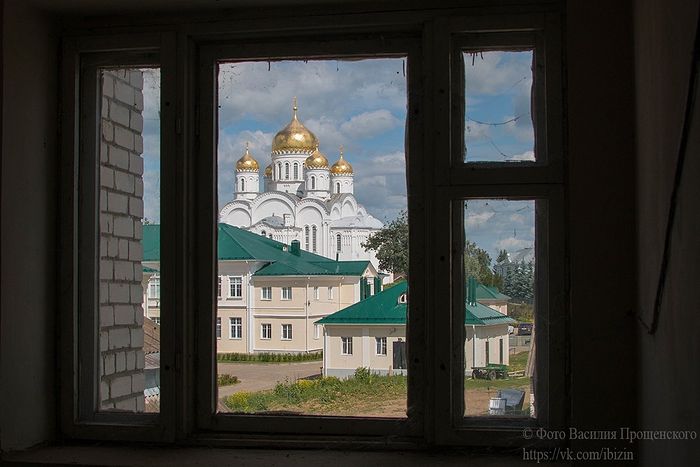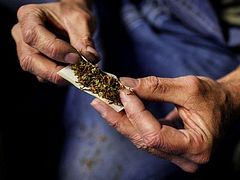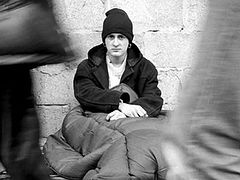But many that are first shall be last; and the last shall be first (Mt. 19:30).
Once he was an ordinary drug addict from a town in Russia’s far north, where people extracted petroleum and made good money, while youngsters would stay at home, very bored, and watch the then popular Crime Fiction movie. When heroin appeared, teenagers knew what they should do. Newspapers of that time wrote about “the heroin pandemic” and “a war on drugs”, but soon they forgot this completely as if it were a nightmare. But he didn’t forget anything—he remembered his friends who had died of drug overdoses and remembered the day when he himself should have died.
Half of his classmates didn’t live to see their graduation, and almost every week they went to somebody’s funeral. His best friend Dimka [a diminutive form of the name Dmitry.—Trans.], with whom they had been friends since kindergarten, died right in the playground opposite a window of his own house. In the evening he went outside, shot up in the summerhouse, looked at his mother who was heating up the dinner in the kitchen, and died. Dimka was found next morning, with his dead eyes staring upwards. But he, the hero of our story, survived, though he had wanted to die. Who would want a life where there is nothing but pain and endless lies, his mother’s tears and the broken heart of “the most beautiful young lady in the world” that he had been courting since the eighth grade?
When their first baby was born, he decided that his heroin addiction was over and done with. “I have a son!” His heart was beating strongly and gladly, and the world around him began to shine with new colors. He stormed into the hospital maternity ward with a large bouquet of white roses in his hands. He kissed his wife and son many times. The baby weighed 3.9 kilos [c. 8.6 pounds)—a healthy and good-looking baby boy. He took after his dad and his mom at the same time. “He will be intelligent, like his dad, and beautiful, like his mom. Though why should a man be beautiful? A man must be generous and clever!” He shook the doctors’ hands and thanked everybody. He embraced the doctor who had assisted his wife in childbirth and gave him a bottle of cognac and a box of chocolates. “Thank you! You are a real man!” he almost burst into tears of joy and embraced him again. Then, when he was walking along the street, he looked into the faces of the passers-by and wanted to smother them with kisses. “Rejoice, people! My son has been born!”
He bought a bottle of good cognac (nine stars) and drank it right on a bench in the park. Happiness was “burning” his heart just as the sun “burns” ice in April; he overflowed with joy, which was bubbling up and bursting to get out. He called his job and took two-days' paid leave, pleading illness. He was drinking without getting drunk and then he suddenly called a drug dealer. It happened automatically, as if by itself. He was on the point of changing his mind, but an imperious and confident voice inside him said that everything would be well, that he would take just a tiny bit of heroin and by the time his wife and son had left hospital he would have stopped. Because they would begin a new, happy life they had dreamed of so much!
On the seventh day the wife found him standing on the balcony with bleary eyes and a burned-out cigarette in his fingers. She understood everything immediately, but didn’t begin to weep this time. When the doctors came and tried to tie him up, he ran all over the apartment, breaking everything around him and saying loudly that everything was okay with him. Then he found himself lying on the floor, tied to a stretcher, hearing his little frightened son crying in his cradle, and asking them to untie him and let him go to the baby.
A week later the doctors called his wife and told her to come and take him from hospital. She was silent throughout the journey, but when they got home she said she was going to file for a divorce; so she took the baby and went to her mother’s. So he found himself alone in the apartment, amid the things that had been scattered about, thinking that he hadn’t meant any harm to anyone: neither to his wife, nor to his mother (who had turned from a beautiful lady into an old woman in a matter of a few years), let alone their newly-born child! How did it come about that after doing very well at school and going in for sports all his life he got hooked on this garbage—that is, drugs?!
“May they be happy! Is it so difficult?! Don’t they really deserve simple human happiness?!” He knew what he should do. He called his wife and inquired after their son. Next he dialed his mother’s number and asked her forgiveness. His mother was at work as usual; she said she was very busy and promised to call him back later. There was no one else in the world he could talk to. He disconnected his cellphone, took a lethal dose of heroin, and went out to die on the common stair. He didn’t want to die in the empty apartment: he was horrified by the very thought that his body would probably begin to decay before he was found.
He was standing on the eighth floor’s stair landing and looking down at the park near their block of flats through the window. There was a church in the middle of the park, and on that fine autumn day its domes gleamed in the sun. Many mothers would go there to pray for their children who were dying of heroin-related causes, and his mother was among them. She had brought prosphora and some holy water for him, but this wouldn’t help—he continued to shoot up and she stopped going to church. Now he was looking at the dome with a cross, glittering in the sun, and waiting for death to come. But it was slow in coming, though a tenfold heroin overdose should have caused a quick death. Meanwhile, death was still not going to take him, and he was gazing down at the golden cross on the church dome and couldn’t tear himself away from the view. The thought that the last thing he would see before his death was the church near their home made him glad. He felt warmth and peace in his heart—something he had not experienced for a long time. He closed his eyes and slowly sank to the cold concrete floor.
Later doctors in the resuscitation department raised their hands in surprise, unable to fathom why he was alive, since he should have died according to all the laws of medicine. The patient himself could understand nothing but wanted to find out the reason. So, as soon as he was discharged from hospital, he went to the church at which he had been looking on that day before while losing consciousness.
An elderly priest was listening to his incoherent story without interrupting him. Every now and then he whispered the words of prayers and made the sign of the cross. When he asked him what should he do, the priest squeezed his hand tight and said, looking into his eyes: “Live!” And then the priest advised him to go to a monastery to distance himself from his old friends and habits: “Go to Abalak Monastery1 to Fr. Zosimas2. With the help of God you will recover there and start your life anew! Meanwhile, I will write a letter to Fr. Zosimas.”
Although he knew nothing about the life of the Church except the Lord’s Prayer (his grandmother had told him to learn it by heart when she had him baptized as a child during vacation), something changed in him after surviving when he should have died. So two days later he took a train to Tobolsk, and Abalak Monastery was less than a hour’s journey from there by bus.
He was admitted to the monastery with the priest’s letter but warned that should he break the monastery’s rules he would not be allowed to stay in the monastery. Then he was brought to his cell on the first floor of old wooden living quarters, where he was to share the space with five other people. There were bunk beds and numerous icons in the cell, complete with an old stove in the corner with ornamented tiles which were about to fall off it. The people showed him a vacant bed with a bedside table and left promptly. He put the things in their places, covered the creaky iron bed with clean bedclothes that he had received from the monastery steward, got under the blanket, gazed at the shabby soot-blackened ceiling for a long time and fell asleep.
For the first two weeks he thought only about running away. After the morning compulsory prayer services and obediences he wanted to be expelled as soon as possible and nearly provoked a fight over trifles on two occasions, but the people in the cell were worldly-wise, knew what’s what, and didn’t let the brother struggle all alone with the temptation. In the evening a toothless old man sat down next to him. It turned out that the man was in his early forties; he showed him heroin syringe marks on the sunken veins of his arms and said: “Hold on, brother! This will pass! Since the Lord has brought you here, rest assured that you will be healed in this place!”
And his words came true! The physical pain was gone, insomnia disappeared, and mental anguish changed into peace. Two months later he would wake up before the alarm-clock and was the first to go to church to pray. In the daytime he would chop firewood, carry the water, work in the monastery’s kitchen-garden or help in the church. In the evenings he would read about saints in the books he was given, drink tea with the brethren, and talk about the salvation of soul and prayer—the only things that can be discussed in a monastic cell in the evening. After half a year he was allowed to sing in the choir and work at the bakery—one of the most difficult yet honored obediences in the monastery. After the nighttime shift he could go off with fatigue while walking, but he smiled every time he returned to the cell with hot bread for the brethren, wrapped in paper. Recalling his former life at night, he was ready to endure any torments to atone for his past sins; tears were rolling down his cheeks by themselves, and his heart was comforted by repentance, hope and inexplicable peace.
This new life according to the centuries-old monastery rules, where there are no “fors” and “againsts” and endless “maybes”, where everything is dedicated to one cause—to guide man towards God—was clear and simple, like the light of an icon lamp, which you can only look at and pray. And he prayed, worked, wept, and was consoled.
When at Pascha they walked in cross procession around the monastery, he was entrusted with the task of carrying the lantern with a candle and heading the procession, thus lighting the way for the others. Awe-stricken, he was carrying the fire, wiping his tears furtively because the Lord had blessed him to give light, and his heart was ready to explode with joy. One day he talked with the father-superior, Archimandrite Zosimas, about life. He could easily be confused with some monastery novice because he used to wear an old, threadbare outer cassock (ryassa), which any simple monk would be ashamed of putting on. When the former drug addict first saw Fr. Zosimas digging up potatoes with his novices (with his inner cassock rolled up) and carrying heavy bags knee-deep in mud, he couldn’t believe that this monk was the monastery’s abbot and a famous archimandrite. Then he came to Fr. Zosimas to confess his sins and asked no more questions thenceforth. Old-timers adored the father-superior secretly (though many of them were of the same age with him); they respected him and regarded him as an experienced spiritual father. It was said of Fr. Zosimas that he took under his spiritual guidance and led directly to the Heavenly Kingdom all who came to the monastery seeking the will of God and salvation and not to escape their problems or a cold winter.
Fr. Zosimas heard him out and told him to go back home to his family. “Don’t wonder whether she is waiting for you or not; don’t hesitate, just go to your wife and beg for her forgiveness! You have come to believe in God and now hold to your faith as to your most precious treasure regardless of your difficulties! Life will offer you various temptations, trying to drag you back to your past. Don’t look back lest you should become a pillar of salt like Lot’s wife; instead, walk towards God! Today, we live in a time when it is extremely hard to keep our faith. And the Lord knows this. Therefore, a great reward awaits those who live according to their conscience and try their best to please God; they will receive rewards higher than what many saints of olden times received! The Lord doesn’t demand that you abstain from food, drink or sleep, or distribute your possessions to the poor. Just do the little things that you must do: be a faithful husband and a good father! And do it with God and not just on your own. Don’t show excessive zeal; just be a good, honest worker, don’t steal, don’t be rude to anybody—and you will have a great glory in heaven!” Then Fr. Zosimas gave him a copy of the icon of the Holy Theotokos, “See My Humility”, blessed him with a cross from the lectern and let him go in peace.
Having arrived to his native town, he went to his mother-in-law straight from the railway station. His ex-wife opened the door, holding their son in her arms. The baby was not frightened at the sight of a bearded man, whose face was covered with stubble—on the contrary, the boy burst out laughing and reached out for him to get to know him better. When the toddler fell asleep, they talked all night long and the wife agreed to return to him. They didn’t remain in that northern town however; they moved to Yekaterinburg where her sister lived. He was employed by a building company, so he worked in his field. In the beginning they rented an apartment.
Like somebody who had been in a coma for years, now he was learning to build up everything all over again, rejoicing at every little thing. Formerly he would have made a screw-loose sign if he had been told to take up some hard and inconvenient job (which everybody tried to avoid) or stay at work till late to take somebody else’s place; but now he would agree without a second thought, just helping others and carrying out a necessary job. And he didn’t do it in order to please the boss or receive a super-positive compliment on his performance. In reality, whenever he was doing good to others he felt that he lived, felt connected with others by thousands of warm, invisible threads, which filled his heart with joy and made him smile just as a baby smiles when it comes rushing into a room, laughing and crying to the adults: “Hello! I am here!”
From time to time he remembered the people he had shared the cell with and smiled. Many of them had lost everything, but in the monastery they found more than they could have ever desired—the other people for the sake of whom life was worthwhile. And the more they lived for others the more they became themselves—the beautiful, kind and intelligent people they had long forgotten. And he couldn’t get used to the new reality for a long time either, that there was no more need for him to hide under the blanket, in his agony trying to put off the beginning of yet another meaningless, dull day when everything was known beforehand. Each new day in his new life was unique, and each day had a reason to do good, to rejoice and marvel.
Formerly he used to take his wife to expensive restaurants, but now he searched for recipes on the web, went to the market to buy food and cooked dinner himself. Although he was not always successful, his wife smiled and ignored such trifles as an oversalted salad or undercooked meat. He liked walking in the park, sitting on the bench, holding his wife’s hand and observing their son playing with other children. The question of faith was solved as if by itself. His other half said that after the monastery he was really transformed and had turned back into the man whom she had once come to love. They had their son baptized and became parishioners of the beautiful St. Alexander Nevsky’s Cathedral of Novo-Tikhvin Convent, Yekaterinburg, near which they lived.
Initially, they money was tight, so he willingly made some money on the side and often stayed at work till late. Once he was walking through the park on his way home and found a wallet right on the path. When he opened it he was dazzled by numerous 1,000 ruble banknotes; besides, there were credit cards and a driver’s license in the wallet. He had never found anything of this kind before, but now he had money to burn in his hands—right at the time when they were in desperate need of money! Earlier he would have taken the money without a second thought and would have given the credit cards and the driver’s license back to their owner for a reward. The owner would have paid him without objection and expressed his great appreciation. But now he put the money carefully back into the wallet and took it first to the editorial office of one newspaper and then to a lost-and-found desk. When a smiling secretary asked for his phone number in case the owner wanted to call him back and thank him, he declined and left quickly.
When their child started kindergarten, his wife began to work part-time as an accountant. A year and a half later they took out a mortgage and moved to a two-room apartment in a new block of flats. He wanted a second child, but she couldn’t conceive for a long time. Doctors from their family clinic suggested that they resort to IVF, but the couple took a vacation and went on a pilgrimage to holy sites. First they travelled to the Holy Hierarch John in Tobolsk, then stayed and prayed for three days at Abalak Monastery, then to the Holy Righteous Simeon of Verkhoturye (the Sverdlovsk region), and, lastly, to the Holy Royal Passion-Bearers’ Monastery in Ganina Yama. And a month later his spouse announced with a smile that he would become a father. Every Sunday they attended Novo-Tikhvin Convent, confessed and took Communion regularly.
But a tragedy happened when she was in the eighth month of pregnancy. On the New Year’s Eve a short circuit caused a devastating fire on their floor of the block of flats. Although the family was rescued, their apartment was gutted by fire. The rescuers said that they were lucky, while a man from the apartment opposite had been unable to get out and died from smoke inhalation. In the rescuers’ vehicle his wife began to feel sharp pains in the lower abdomen, so they were immediately rushed to a perinatal center instead of a maternity home. It was a difficult delivery, so she underwent an emergency Caesarean section to save the baby. The surgery lasted several hours; all that time he was standing in the hospital corridor and praying. Those hours seemed an eternity to him; the doctors didn’t come out, which meant that there was something wrong in the operating room, but now all he could do was pray and believe. He was whispering the words of prayers like a criminal on the steps leading to the scaffold crying for mercy. And when, at long last, the doctors appeared, he looked at them, unable to understand what they were saying. When he finally got them, he sat down on the floor and just wept with joy. Both the baby and the mom were saved, but another urgent operation was needed and it could be performed only in Moscow. His wife with the newly-born daughter were conveyed to Moscow in a special flight of the Ministry for Emergency Situations’ plane and the next morning she had two major surgeries. In the evening he got a phone call and was informed that a week later he would be able to see them.
In front of the hospital ward he remembered that he had intended to bring her flowers and an icon of the Mother of God. But his next thought was that the Queen of Heaven was with them all the time, as She is, and just entered the ward. His wife who looked awfully emaciated gave him a faint smile from under the white blanket. He kissed her hot, dry forehead, holding her wrist (which had become thin, weightless, transparent, and resembled that of a child) in his hand and couldn’t let it go for some while. The daughter was in an incubator next door. The doctors didn’t allow him to see her but assured him that everything would be well with her.
He thanked the doctors and left quickly without arguing or persuading them otherwise. He knew that those wonderful professionals would do their best, and even more than that, while he felt an urge to go to the Cathedral of Christ the Savior where he had never been before. It suddenly dawned upon him that he must go there and nowhere else.
When he saw the huge, magnificent cathedral in the rays of the setting sun, it warmed his heart. He stood through the evening service and then ordered forty days’ prayers and submitted the intercession lists for the health of all whom he knew. Next he walked down to the Moskva River’s embankment. He was walking, breathing the fresh evening air that was blowing from the river, and smiling.
1 Abalak Monastery of the Sign, one of the greatest holy places of Siberia, is situated in the village of Abalak of the Tobolsk district of the Tyumen region, not far from the city of Tobolsk, on the right bank of the River Irtysh. It was there that according to tradition the wonderworking Abalak icon of the Holy Theotokos was revealed to the pious widow Maria in 1635. The Monastery of the icon of the Sign was founded there in 1783. The wonderworking icon is kept there to this day.
2 Archimandrite Zosimas (Gorshunov), who for many years was Abbot of Abalak Monastery, is revered by many as a “living elder”.






